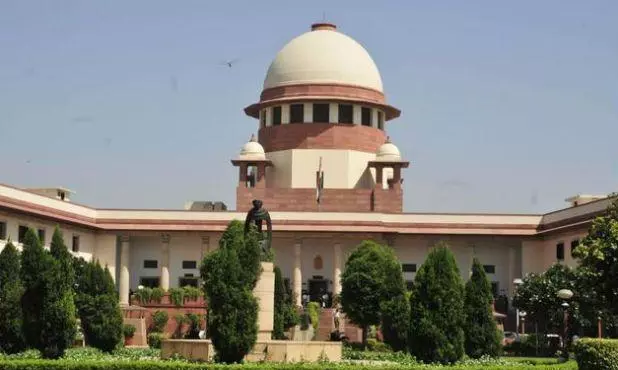
New Delhi: The Akhil Bhartiya Sant Samiti, a Hindu outfit, moved the Supreme Court on Monday seeking to intervene in cases filed against the validity of provisions of the 1991 law that asks to maintain the religious character of places as it existed on August 15, 1947. The outfit's plea, filed through lawyer Atulesh Kumar, challenges Sections 3 and 4 of the 1991 Act, arguing they violated several fundamental rights including right to equality and freedom to practice religion.
The 1991 law prohibits conversion of any place of worship and provides for the maintenance of the religious character of any place of worship as it existed on August 15, 1947. However, the dispute relating to Ram Janmabhoomi-Babri Masjid at Ayodhya was kept out of its purview.
A bench headed by Chief Justice Sanjiv Khanna, on December 12, 2024, restrained till further directions the courts in the country from examining fresh lawsuits and passing any effective interim or final orders in pending ones seeking to reclaim religious places, especially mosques and dargahs (a muslim shrine).
The top court is hearing about six petitions challenging various provisions of the Places of Worship (Special Provisions) Act, 1991. There are also several pleas of intervention by some Muslim bodies seeking effective implementation of the law. The Hindu body, in its fresh plea, challenges the validity of Sections 3 and 4 of the 1991 Act on various grounds. Section 3 of the Act prohibits the conversion of places of worship, while Section 4 bars courts from entertaining disputes regarding the religious character of such places.
The application alleged these provisions validated places of worship established by "barbaric invaders" while infringing upon the rights of Hindus, Jains, Buddhists, and Sikhs for reclaiming and restoring their sacred sites. The samiti, headquartered at Vrindavan and Varanasi, said the 1991 law undermined judicial authority by barring the courts from reviewing disputes which was in violation of the basic structure of the Constitution.
"The Act prevents judicial review which is one of the fundamental aspects of the Constitution therefore violates the basic structure of the Constitution of India," it said. The law's retrospective cutoff August 15, 1947 date, disregards historical injustices and denies communities the right to seek redress, it said.
The plea said the law restricted Hindus, Jains, Buddhists, and Sikhs from reclaiming places of worship, and consequently infringed their constitutional right to freedom of religion. On January 2, the top court agreed to examine a fresh plea of AIMIM chief Asaduddin Owaisi seeking effective implementation of the 1991 places of worship law and ordered it to be tagged with the pending cases on the issue while posting the hearing on February 17.
The top court, through its December 12, 2024 order, effectively stalled proceedings in about 18 lawsuits filed by various Hindu parties seeking survey to ascertain original religious character of 10 mosques including Gyanvapi at Varanasi, Shahi Idgah Masjid at Mathura and Shahi Jama Masjid at Sambhal where four persons' lives were snuffed out in clashes.
Muslim bodies like Jamiat Ulama-i-Hind have sought the strict implementation of the 1991 law to maintain communal harmony and to preserve the present status of mosques, sought to be reclaimed by Hindus on the ground that they were temples before invaders razed them.�

